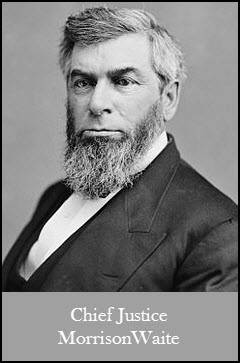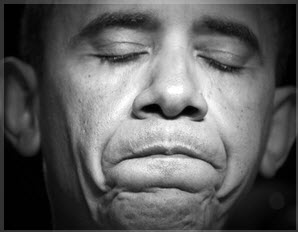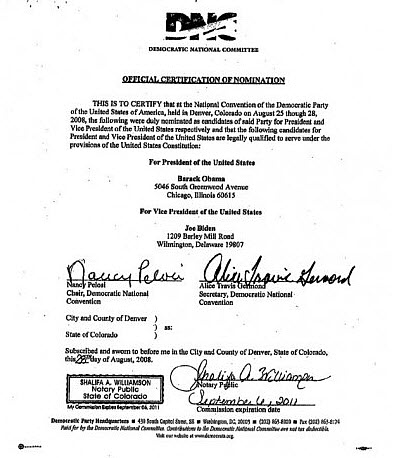U.S. Supreme Court Has Ruled on Obama’s Eligibility!!
By Craig Andresen on November 13, 2011 at 5:23 pm
According to the United States Supreme Court, Obama is ineligible to be the President. That’s right, you read that correctly. The United States Supreme Court has ruled that Obama is ineligible to serve as President.
It’s not that you haven’t been paying attention lately and yes, you can be excused for missing the ruling as it came down, not in the last few days but back in 1875.
This is the argument currently being made by the Liberty Legal Foundation.
The Liberty Legal Foundation has filed not 1 but 2 lawsuits, one in Arizona and the other in Tennessee neither of which have one single thing to do with Obama’s birth certificate OR challenging whether or not Obama was born in the United States.
There is no need for either in regard to these lawsuits.
At the core of this action is a simple request that Federal courts uphold the Supreme Court ruling. Both lawsuits, and the Liberty Legal Foundation promises there will be more, would render it impossible for the Democratic National Committee to place Obama’s name on the 2012 ballot.
Here’s the crux of it.
“Natural Born Citizen” was defined as children born of two U.S. citizens – regardless of the location of the birth. It found: “The Constitution does not, in words, say who shall be natural-born citizens. Resort must be had elsewhere to ascertain that. At common-law, with the nomenclature of which the framers of the Constitution were familiar, it was never doubted that all children born in a country of parents who were its citizens became themselves, upon their birth, citizens also.”
Obama’s problem, by his own admission and records of the State Department is this:
Obama’s father was not a United States citizen.
Therefore, via Minor v, Happersett and the United States Supreme Court in 1875, Obama is ineligible because, since his father was not a U.S. citizen, Obama is not a natural born citizen.
For a person to run, as his or her party’s nominee for President, the party must issue certification that the person named is eligible under the United States Constitution to become President.
Because the Constitution does not specify the definition of “Natural born citizen” it was left to the United States Supreme Court which, in 1875, defined it as a person born in a country of parents who were its citizens and, Obama’s father was NOT a U.S. citizen.
Bring this up to your liberal friends and they will laugh at you and call you a right wing nut job for
the quick and accurate response is clear. YOU are not saying this, and neither is the Liberty Legal Foundation. Obama is ineligible so sayeth the United States Supreme Court and if they care to attempt to label the United States Supreme Court of 1875 as right wing nut jobs…so be it and good luck with that.
If the Democratic Party should certify Obama, in the face of this ruling, they would be acting in a fraudulent manner and according to the actions being brought by the Liberty Legal Foundation, it is the political parties which are solely responsible for that certification and the Liberty Legal Foundation intends to hold BOTH parties accountable.
To be specific, the case of Minor v. Happersett was not intended as to solve the question of Presidential eligibility at all. That case was in regard to a woman’s right to vote and while the case itself didn’t draw this specific issue into question, the Chief Justice, Morrison Waite, did, in fact address it in the issuing of the Supreme Court’s decision.
“The Constitution does not, in words, say who shall be natural-born citizens. Resort must be had elsewhere to ascertain that. At common-law, with the nomenclature of which the framers of the Constitution were familiar, it was never doubted that all children born in a country of parents who were its citizens became themselves, upon their birth, citizens also. These were natives, or natural-born citizens, as distinguished from aliens or foreigners. Some authorities go further and include as citizens children born within the jurisdiction without reference to the citizenship of their [88 U.S. 162, 168] parents.

As to this class there have been doubts, but never as to the first. For the purposes of this case it is not necessary to solve these doubts. It is sufficient for everything we have now to consider that all children born of citizen parents within the jurisdiction are themselves citizens. The words ‘all children’ are certainly as comprehensive, when used in this connection, as ‘all persons,’ and if females are included in the last they must be in the first. That they are included in the last is not denied. In fact the whole argument of the plaintiffs proceeds upon that idea.”
No doubt, liberals will attempt to cling to this line:
“Some authorities go further and include as citizens children born within the jurisdiction without reference to the citizenship of their [88 U.S. 162, 168] parents.”
Note that the Chief Justice Waite follows that with:
“As to this class there have been doubts, but never as to the first.”
In this, the Chief Justice, and therefore, the Supreme Court makes clear that the one definition to which there is no doubt is:
“…that all children born in a country of parents who were its citizens became themselves, upon their birth, citizens also.”
Indeed, there are 4 cases in which the United States Supreme Court has addressed “Natural Born Citizen.
1) The Venus, 12 U.S. 8 Cranch 253 253 (1814)
“The citizens are the members of the civil society; bound to this society by certain duties, and subject to its authority, they equally participate in its advantages. The natives or indigenes are those born in the country of parents who are citizens. Society not being able to subsist and to perpetuate itself but by the children of the citizens, those children naturally follow the condition of their fathers, and succeed to all their rights.”
2) Shanks v. Dupont, 28 U.S. 3 Pet. 242 242 (1830)
“Ann Scott was born in South Carolina before the American revolution, and her father adhered to the American cause and remained and was at his death a citizen of South Carolina. There is no dispute that his daughter Ann, at the time of the Revolution and afterwards, remained in South Carolina until December, 1782. Whether she was of age during this time does not appear. If she was, then her birth and residence might be deemed to constitute her by election a citizen of South Carolina. If she was not of age, then she might well be deemed under the circumstances of this case to hold the citizenship of her father, for children born in a country, continuing while under age in the family of the father, partake of his national character as a citizen of that country. Her citizenship, then, being prima facie established, and indeed this is admitted in the pleadings, has it ever been lost, or was it lost before the death of her father, so that the estate in question was, upon the descent cast, incapable of vesting in her? Upon the facts stated, it appears to us that it was not lost and that she was capable of taking it at the time of the descent cast.”
3) Minor v. Happersett , 88 U.S. 162 (1875)
“The Constitution does not in words say who shall be natural-born citizens. Resort must be had elsewhere to ascertain that. At common law, with the nomenclature of which the framers of the Constitution were familiar, it was never doubted that all children born in a country of parents who were its citizens became themselves, upon their birth, citizens also. These were natives or natural-born citizens, as distinguished from aliens or foreigners. Some authorities go further and include as citizens children born within the jurisdiction without reference to the citizenship of their parents.”
4) United States v. Wong Kim Ark, 169 U.S. 649 (1898)
“At common law, with the nomenclature of which the framers of the Constitution were familiar, it was never doubted that all children, born in a country of parents who were its citizens, became themselves, upon their birth, citizens also. These were natives, or natural-born citizens, as distinguished from aliens or foreigners.”
Clearly, by any of the 4 cases in which the United States Supreme Court has addressed the issue of “Natural Born Citizen” Obama, by the opinions rendered, is not one.
If Obama is not a natural born citizen, he is therefore ineligible to run for or to serve as, the President.
Section 1 of Article 2 of the United States Constitution states:
 “No person except a natural born Citizen, or a Citizen of the United States, at the time of the Adoption of this Constitution, shall be eligible to the Office of President; neither shall any Person be eligible to that Office who shall not have attained to the Age of thirty-five Years, and been fourteen Years a Resident within the United States.”
“No person except a natural born Citizen, or a Citizen of the United States, at the time of the Adoption of this Constitution, shall be eligible to the Office of President; neither shall any Person be eligible to that Office who shall not have attained to the Age of thirty-five Years, and been fourteen Years a Resident within the United States.”
As the Constitution offers no definition of “Natural Born Citizen” it falls to the United States Supreme Court and the 4 cases in which the Supreme Court provides such a definition appear above.
Forget the birth certificate or swirling questions as to his place of birth, the United States Supreme Court has made it clear.
Obama is not eligible to serve as President and should his name appear on ballots in 2012, it will appear there fraudulently.




2 comments:
The Minor v, Happersett decision never ruled any such thing. If it did, Edwin Meese, Ronald Reagan's attorney general, would not have written:
“Under the longstanding English common-law principle of jus soli, persons born within the territory of the sovereign (other than children of enemy aliens or foreign diplomats) are citizens from birth. Thus, those persons born within the United States are "natural born citizens" and eligible to be President...."---- Edwin Meese, et al, THE HERITAGE GUIDE TO THE CONSTITUTION (2005) [Edwin Meese was Ronald Reagan’s attorney general, and the Heritage Foundation is a well-known Conservative organization.]
Re: “Edwin Meese based his analysis on the "common-law principle", not on the Supreme Court precedent. “
Not true. The Wong Kim Ark case is the precedent, and it clearly says that EVERY child born in the USA (except for the children of foreign diplomats) is Natural Born. You hve to be deliberately obtuse to not understand that a US Citizen who fulfills the criteria of Natural Birth as defined by the US Supreme Court in Wong Kim Ark is anything other than a NATURAL BORN US CITIZEN, and that is what Meese wrote.
But the same principle in fact was understood long before Meese, and even long before the Wong Kim Ark ruling. This was written in 1829:
"Therefore every person born within the United States, its territories or districts, whether the parents are citizens or aliens, is a natural born citizen in the sense of the Constitution, and entitled to all the rights and privileges appertaining to that capacity."---William Rawle, A VIEW OF THE CONSTITUTION OF THE UNITED STATES OF AMERICA. 2d ed. (1829)
Re: “He fails to discuss the citizenship of the parents. “
Answer. That is because the citizenship of the parents has no effect on the Natural Born Citizen status of a child born in the USA (other than the children of foreign diplomats). Only the place has effect . That was the original meaning of Natural Born Citizen. Here is an example of how it was used in 1803, shortly after the US Constitution was written:
"Prior to the adoption of the constitution, the people inhabiting the different states might be divided into two classes: natural born citizens, or those born within the state, and aliens, or such as were born out of it. The first, by their birth-right, became entitled to all the privileges of citizens; the second, were entitled to none, but such as were held out and given by the laws of the respective states prior to their emigration. ...St. George Tucker, BLACKSTONE'S COMMENTARIES: WITH NOTES OF REFERENCE TO THE CONSTITUTION AND LAWS OF THE FEDERAL GOVERNMENT OF THE UNITED STATES AND THE COMMONWEALTH OF VIRGINIA. (1803)
As you can see, that refers only to the place of birth. Natural Born Citizens were “those born within a state.”
Re: “He fails to show the legal distinction between "citizens" and "natural born citizens".
Answer the difference is that in the broad category of citizens there are two, and only two, sub categories, naturalized citizens and Natural Born Citizens. Naturalized citizens, who of course were not born in the USA, are not eligible. Natural Born Citizens, who were born in the USA are eligible. A Natural Born Citizen is a US citizen who fulfills the Natural Born criterion, birth in the USA.
Re: “The Framers were very concerned that we never have a President who grew up under parents with divided loyalties, thus dividing the loyalties of the son.”
Answer: Sure, but they did not say that they considered (and hence there is no evidence that they considered) that a US-born child of foreign parents would have less loyalty to the USA than the US-born child of US parents. They were concerned about foreigners becoming president, and hence they barred them (to be a Natural Born Citizen, you must be a US citizen). And they were concerned about naturalized citizens becoming president, and hence they specified that only Natural Born Citizens can become president. But they did not bar the US-born children of foreigners from becoming president. IF they had wanted to, they could have said it, but they didn’t—not in the US Constitution, nor in the Federalist Papers, nor in anything else.
Post a Comment